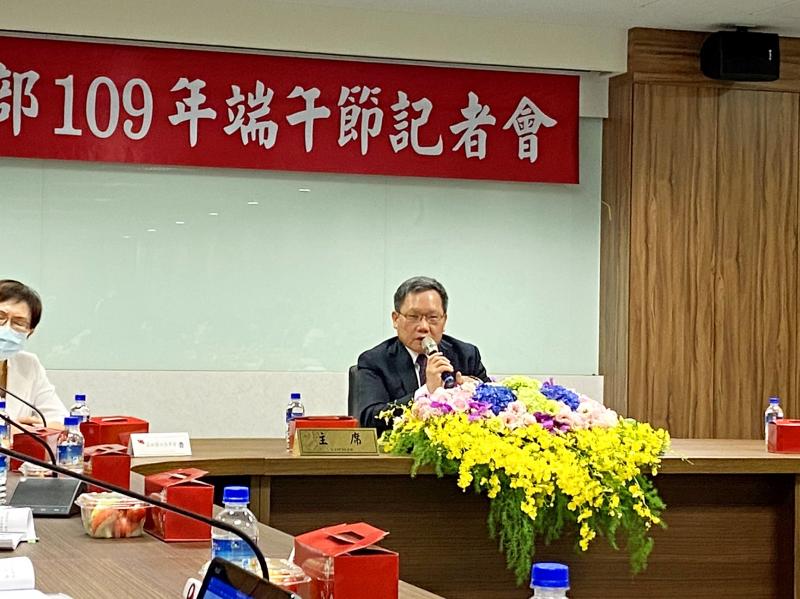The Ministry of Finance yesterday said it would ask state-run banks to offer loans totaling NT$1 trillion (US$33.67 billion) to help local firms upgrade and transform in the post-pandemic era.
The ministry would act as an integrator in facilitating the loans that might be available for a year after the COVID-19 outbreak has stabilized, Minister of Finance Su Jain-rong (蘇建榮) told a media briefing.
The government is mobilizing resources to help local firms recover from the virus shock and grow stronger on the world stage, Su said.

Photo: Wu Chi-lun, Taipei Times
State-run lenders would be asked to offer loans totaling NT$1 trillion at preferential interest rates, capped at 2 percent on top of benchmark policy rates, he said.
That means borrowing costs would stand at 2.81 percent, much lower than an average of 4 percent for loans to small and medium-sized enterprises, Su said.
The funds are intended to support companies that plan to innovate, transform, upgrade and deploy in overseas markets.
Furthermore, venture capital units of state-run financial institutions are encouraged to take the initiative and join forces with private partners in funding promising ventures, he said.
“State-run financial institutions are to take up the role of a locomotive and supply fuel for corporate investment in the post-pandemic era,” Su said.
The six state-run venture capital companies can together come up with NT$10 billion for such moves, he said.
The ministry would lend support to the campaign by providing tax credits, lower tax refund thresholds, friendly tariffs and other incentives, Su said.
The virus outbreak and US-China trade tensions make global supply chain realignment necessary and local firms are weighing upgrade and transformation options to stay in business, he said.
The ministry would continue to assist Taiwanese firms returning from overseas markets and provide incentives for capital repatriation, he added.
The pace of capital repatriation has so far lagged behind government expectations, with only NT$10.55 billion repatriated over the past 10 months, compared with an estimate of NT$133.3 billion annually under a conservative scenario, Su said.
“The figures suggest much room for improvement,” he said.
Su said that the National Stabilization Fund’s steering committee would meet on July 15 to discuss whether to exit the local bourse now that the TAIEX has recovered almost all of the losses it suffered due to the pandemic.
Su declined to speculate on the fund’s movements, saying that the committee would have the final say following a consensus ruling.
Foreign institutional players have mostly rejoined the local market as evidenced by the rallies in the TAIEX and a stronger local currency, he said.

To many, Tatu City on the outskirts of Nairobi looks like a success. The first city entirely built by a private company to be operational in east Africa, with about 25,000 people living and working there, it accounts for about two-thirds of all foreign investment in Kenya. Its low-tax status has attracted more than 100 businesses including Heineken, coffee brand Dormans, and the biggest call-center and cold-chain transport firms in the region. However, to some local politicians, Tatu City has looked more like a target for extortion. A parade of governors have demanded land worth millions of dollars in exchange

An Indonesian animated movie is smashing regional box office records and could be set for wider success as it prepares to open beyond the Southeast Asian archipelago’s silver screens. Jumbo — a film based on the adventures of main character, Don, a large orphaned Indonesian boy facing bullying at school — last month became the highest-grossing Southeast Asian animated film, raking in more than US$8 million. Released at the end of March to coincide with the Eid holidays after the Islamic fasting month of Ramadan, the movie has hit 8 million ticket sales, the third-highest in Indonesian cinema history, Film

Taiwan Semiconductor Manufacturing Co’s (TSMC, 台積電) revenue jumped 48 percent last month, underscoring how electronics firms scrambled to acquire essential components before global tariffs took effect. The main chipmaker for Apple Inc and Nvidia Corp reported monthly sales of NT$349.6 billion (US$11.6 billion). That compares with the average analysts’ estimate for a 38 percent rise in second-quarter revenue. US President Donald Trump’s trade war is prompting economists to retool GDP forecasts worldwide, casting doubt over the outlook for everything from iPhone demand to computing and datacenter construction. However, TSMC — a barometer for global tech spending given its central role in the

Alchip Technologies Ltd (世芯), an application-specific integrated circuit (ASIC) designer specializing in server chips, expects revenue to decline this year due to sagging demand for 5-nanometer artificial intelligence (AI) chips from a North America-based major customer, a company executive said yesterday. That would be the first contraction in revenue for Alchip as it has been enjoying strong revenue growth over the past few years, benefiting from cloud-service providers’ moves to reduce dependence on Nvidia Corp’s expensive AI chips by building their own AI accelerator by outsourcing chip design. The 5-nanometer chip was supposed to be a new growth engine as the lifecycle